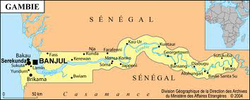Updated: Sept. 25, 2012 (Initial publication: July 11, 2012)
Sectorial Analysis

ENGLISH
After suspending the freeze of gas prices for consumers, the "Conseil d’Etat" (French Council of State) in a judgment of 10 July 2012, cancels the freeze, as it constitutes an error of law, because it shows that the Government has not incorporated or offset procurement costs borne by the public service provider.
FRENCH
Après avoir suspendu le gel des tarifs gaiers pour les consommateurs, le Conseil d’Etat, dans un arrêt du 10 juillet 2012, a annulé l’arrêté qui avait imposé ce gel, en ce qu’il constitue un erreur de droit, parce qu’il montre que le Gouvernement n’avait pas incorporé ou offert de compenser les coûts supportés par le fournisseur de service public.
Updated: Sept. 25, 2012 (Initial publication: Jan. 4, 2012)
Sectorial Analysis

Translated Summaries
In The Journal of Regulation the summaries’ translation are done by the Editors and not by the authors
ENGLISH
On November 28, 2011, the French Council of State issued a summary judgment suspending the Government price freeze on household natural gas prices because the ‘price scissors’ effect it had was harming competition, and because no superior legal norm justified the freeze.
FRENCH
Le 28 Novembre 2011, le Conseil d’Etat a rendu une Ordonnance de référé, suspendant le gel des prix du gouvernement concernant les prix domestiques du gaz naturel, car l’effet de «ciseaux des prix" avait pour effet de nuire à la concurrence, et parce qu’il n’existe pas de norme juridique supérieure justifiait ce gel des tarifs par un décret.
SPANISH
El 28 de noviembre de 2011, el Consejo de Estado francés emitió una orden judicial de congelación del precio del gobierno sobre los precios internos del gas natural, porque el efecto del "precio de tijeras" efecto fue el de perjudicar a la competencia, y porque no existe una norma legal que justifica el congelamiento de las tarifas por decreto.
ITALIAN
Il 28 novembre 2011, il Consiglio di stato francese ha reso una sentenza sommaria in cui ordina la sospensione de gelo dei prezzi del gas naturale per le famiglie, previsto precedentemente dal governo, l’effetto “forbice prezzi” causato da tale decisione stava causando danni alla libera concorrenza e poiché tale decisione di gelare i prezzi non era fondata su nessuna norma legale superiore.
SPANISH
El 28 de noviembre del 2011, el Conseil d’Etat (Consejo de Estado de Francia) decidió que la prohibición de los OGM establecido por varias decretos ministeriales en diciembre 2007 y febrero 2008 no son válidos. La razón principal detrás de esta decisión es la falta de prueba suficiente dada por el gobierno francés que los OGM representan una gran amenaza a la salud pública y el ambiente. No obstante, los Ministros de Agricultura y Ambiente declararon el 13 de enero 2012 que esta misma prohibición será adoptada.
........................
Other translation forthcoming.
Updated: Sept. 25, 2012 (Initial publication: Oct. 7, 2011)
Sectorial Analysis

Translated Summaries
In The Journal of Regulation the summaries’ translation are done by the Editors and not by the authors
ENGLISH
Thematic Report (Energy): The French energy regulator publishes its first unfavorable opinion regarding the government’s proposed natural gas tariffs for residential customers.
The Commission de Régulation de l’Energie (CRE — French energy regulator) published an opinion “regarding the draft executive order regarding the regulated tariffs for natural gas publicly distributed by GDF Suez.” This non-binding opinion was published on September 29, 2011, and claims that it is not acceptable for the Government to leave natural gas prices unchanged because these prices do not cover GDF Suez’s costs and symmetrically prevent newcomers from competing with it.
ITALIAN
Relazione tematica (Energia): L’autorità di regolazione francese nel settore dell’energia ha reso pubblica il suo primo parere sfavorevole a proposito delle tariffe del gaz proposte dal governo per le utenze residenziali
La Commission de Régulation de l’Energie (CRE – l’autorità francese di regolazione nel settore dell’energia) ha reso pubblico un parare « riguardante la bozza di proposte di tariffe per il gaz naturale distribuito da GDF Suez ». Questo parere non vincolante è stato pubblicato il 29 settembre 2011 e afferma che non è possibile per il Governo di lasciare immutati i prezzi del gas naturale poiché questi prezzi non coprono i costi di GDF Suez e, al contempo, impedisce ai nuovi operatori di competere con tali costi.
.....................
Other translations forthcoming.
Updated: Sept. 10, 2012 (Initial publication: July 6, 2012)
Sectorial Analysis
Updated: July 23, 2012 (Initial publication: July 8, 2012)
Breaking news

Updated: July 17, 2012 (Initial publication: July 10, 2012)
Breaking news

Updated: June 4, 2012 (Initial publication: May 22, 2012)
Breaking news

Updated: Jan. 16, 2012 (Initial publication: Oct. 7, 2011)
Translated Summaries

Updated: Jan. 9, 2012 (Initial publication: Jan. 9, 2012)
Thesaurus : Doctrine
Updated: Jan. 9, 2012 (Initial publication: Jan. 9, 2012)
Thesaurus : Doctrine
Updated: Jan. 9, 2012 (Initial publication: Jan. 4, 2012)
Contributions

Updated: Jan. 4, 2012 (Initial publication: May 28, 2011)
Releases : I. Isolated Articles
Translated Summaries
ENGLISH
Two and a half years after having been established by the LME, the French Competition Authority has uncontestably acquired its “place in the sun” amongst the competition authorities of other countries, as demonstrated by multiple indicators.
ITALIAN
Articolo: L’Autorità garante della concorrenza tra “regolazione” e politica in materia di concorrenza
Due anni e mezzo dopo l’instaurazione da parte del LME, l’Autorità francese garante della libera concorrenza ha trovato il suo posto tra le diverse autorità degli altri paesi, così come è stato dimostrato da diversi indicatori.
SPANISH
Artículo: La Autoridad de la competencia, entre “regulación” y política competitiva.
Después de dos años y medio de haber sido establecido por el LME, la Autoridad francesa de la competencia ha incontestablemente adquirido su “lugar bajo el sol” entre las autoridades de la competencia de otros países, como demostrado por varios indicadores.
.....................
Other translations forthcoming.
Updated: Oct. 7, 2011 (Initial publication: Oct. 7, 2011)
Contributions

Updated: Sept. 7, 2011 (Initial publication: Sept. 1, 2011)
Contributions

Updated: Aug. 31, 2011 (Initial publication: June 9, 2011)
Contributions

Updated: July 19, 2011 (Initial publication: July 1, 2011)
Bibliographic Reports : Books

Updated: June 16, 2011 (Initial publication: May 27, 2011)
Releases : I. Isolated Articles
ENGLISH
Competition is the principle element of markets, in the princely sense of the term.The relationships that regulation maintains with competition are ambiguous. It is important to eliminate this ambiguity in order to reveal the ab initio opposition between regulation and competition, to shed light upon the dialectics between both of them. Indeed, regulation may aim at building competition, and is thereby presented as a tool that will cease being used when the competitive market functions effectively.
Administration - Autorité de Régulation des Communications électroniques et des Postes - Competition - Competition Authority - Conflict of intersts - Consumer - Contract - Equilibrium - European Commission - Ex ante / Ex post - Government - Hayek - Horyzontal regulation - Information asymmetry - Liberalisation - Market failure - Natural economic monopoly - Online gambling - Political mandate - Postal services - Power - Principle - Real economy - "Réglementation" - Regulator - Regulatory Authority - Self regulation - symmetrical regulation - Telecommunication - Tool - Watchdog *
* In The Journal of Regulation, these keywords are done by the Editor and not by the Author.
PORTUGUESE
Artigo: Regulação versus Concorrência
Concorrência é o principal elemento dos mercados, no mais genuíno sentido da palavra. As relações que regulação mantém com a concorrência são ambíguas. É importante eliminar essa ambiguidade de modo a relativizar a oposição ab initio entre regulação e concorrência, para trazer luz para a dialética entre elas. Com efeito, regulação pode tender a construir a concorrência, e é então apresentada como uma ferramenta que deixará de ser usada quando o mercado competitivo passar a funcionar realmente.
Administração – Autorité de Régulation des Communications électroniques et des Postes – Concorrência – Autoridade de concorrência – Conflito de interesse – Consumidor – Contrato – Equilíbrio – Comissão Europeia – Ex ante / Ex post – Governo – Hayek – Regulação horizontal – Informação assimétrica – Liberalização – Falha de mercado – Monopólio econômico natural – Jogo em linha – Mandato político – Serviços postais – Poder – Princípio – Economia real – Regulamentação – Regulador – Autoridade de regulação – Auto-regulação – Regulação simétrica – Telecomunicações – Ferramenta – Observador*
* No Journal of Regulation, as palavras-chave são fornecidas pelo Diretor, e não pelo Autor.
ITALIAN
Articolo: Regolazione vs. Concorrenza
La concorrenza è il principio fondamentale dei mercati, nel senso stretto del termine. Le relazioni tra regolazione e concorrenza sono ambigue. Per rivelare il contrasto tra regolazione e concorrenza è importante cancellare questa ambiguità e chiarire la dinamica di questi due concetti. In effetti, la regolazione punta a sviluppare la concorrenza ed è spesso considerata uno strumento che non avrà più ragion d’essere una volta che il mercato funzionerà in libera concorrenza.
Amministrazione - Asimmetria dell’informazione - Autoregolazione - Autorità di regolazione - Autorité de Régulation des Communications électroniques et des Postes - Autorità garante della concorrenza - Commissione Europea - Concorrenza - Conflitto di interessi - Contratto - Consumatore - Economia reale - Equilibrio - Ex ante / Ex post - Governo - Hayek - Liberalizzazione - Mancato Funzionamento del mercato - Monopolio economico naturale - Mandato politico - Potere - Principio - "Regolamentazione" - Regolatore - Regolazione orizzontale - Regolazione simmetrica - Servizi postali - Scommesse online - Strumento - Telecomunicazioni - Vigilanza *
* In The Journal of Regulation, le parole chiave sono responsabilità dell’Editore e non dall’Autore.
SPANISH
Artículo: Regulación versus la competencia
La competencia es el elemento principal de los mercados, en precisamente el sentido de este término. Es importante eliminar esta ambigüedad para poder revelar la posición ab initio entre la regulación y la competencia, para poder traer a luz las dialécticas entre las dos. Así tanto, la regulación puede intentar construir la competencia, y es, por consiguiente, un instrumento que cesará de ser utilizado cuando el mercado competitivo funcione de manera eficaz.
Other translations forthcoming.
